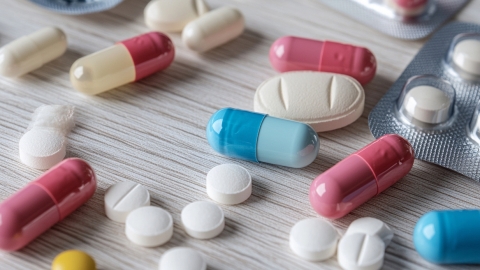What medication can control gallbladder polyps?
In general, gallbladder polyps are mostly benign lesions. Some medications can help control the condition by improving the gallbladder environment and managing inflammation. Patients may use medications such as ursodeoxycholic acid capsules, cefuroxime axetil tablets, metronidazole tablets, anti-inflammatory and bile-promoting tablets, and Jin Dan tablets under medical guidance. Detailed analysis is as follows:

1. Ursodeoxycholic Acid Capsules
Ursodeoxycholic acid capsules contain ursodeoxycholic acid as the main ingredient, which helps regulate bile composition, promote bile excretion, and reduce cholesterol deposition in the gallbladder. For cholesterol polyps, this medication inhibits the formation of cholesterol crystals, slows polyp growth, and may even shrink small cholesterol polyps, thereby helping to control disease progression.
2. Cefuroxime Axetil Tablets
Cefuroxime axetil tablets belong to the cephalosporin class of antibiotics and exert bactericidal effects by inhibiting bacterial cell wall synthesis. When gallbladder polyps are accompanied by cholecystitis, bacterial infection may exacerbate inflammatory responses. This drug effectively kills common pathogens such as *Escherichia coli* and *Klebsiella pneumoniae*, controls inflammation, reduces gallbladder irritation, and indirectly helps stabilize the status of the polyps.
3. Metronidazole Tablets
Metronidazole tablets are nitroimidazole-class antimicrobial agents with potent activity against anaerobic bacteria. Anaerobic bacterial infections are commonly associated with cholecystitis accompanying gallbladder polyps. This medication specifically suppresses the growth of anaerobic bacteria, alleviates symptoms such as abdominal pain and bloating caused by inflammation, prevents recurrent inflammatory stimulation that could worsen polyp conditions, and thus assists in disease management.
4. Anti-inflammatory and Bile-Promoting Tablets
Anti-inflammatory and bile-promoting tablets are traditional Chinese medicine preparations primarily composed of *Andrographis paniculata*, *Rabdosia serra*, and *Picrasma quassioides*. They have functions of clearing heat, removing dampness, and promoting bile flow. These tablets enhance bile secretion and excretion, reduce bile stasis in the gallbladder, and alleviate inflammatory responses. For inflammation-related gallbladder polyps, they improve the internal gallbladder environment and reduce inflammatory stimulation to the polyps, thereby helping control polyp development.
5. Jin Dan Tablets
Jin Dan tablets consist of gentian (*Gentiana scabra*), *Lysimachia christinae* (herba lysimachiae), *Polygonum cuspidatum* (hu zhang), and pig bile extract. They function to clear heat, eliminate dampness, promote bile flow, and facilitate stone expulsion. The formulation promotes bile circulation, relieves symptoms of damp-heat in the gallbladder, and alleviates discomfort caused by cholecystitis. For gallbladder polyps formed due to bile stasis and inflammatory irritation, these tablets help control polyp growth by improving gallbladder function and maintaining a stable gallbladder state.
In daily life, it's important to maintain regular eating habits and avoid high-fat, high-cholesterol foods such as animal offal and fried foods, which may increase the burden on the gallbladder and hinder effective disease management.




